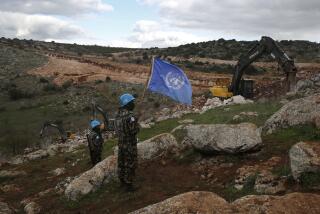Despite Aristide Plea, OAS and U.N. Pull Observers
- Share via
WASHINGTON — The United Nations and the Organization of American States, concerned about their human rights monitors’ safety in Haiti, rejected a plea from exiled President Jean-Bertrand Aristide and agreed to withdraw the workers from the beleaguered Caribbean nation.
Aristide, in an interview with The Times and The Miami Herald, said he discussed the Haitian military’s expulsion order with U.N. Secretary General Boutros Boutros-Ghali and told him, “Personally, I would defy it.”
But a U.N. spokesman announced that Boutros-Ghali and Christopher R. Thomas, acting OAS secretary general, decided to pull the observers out “in the next day or so.” Spokesman Joe Sills said the withdrawal was ordered out of concern for the safety of the more than 100 observers.
Their withdrawal means that just a handful of foreign embassy officials and private U.S. groups will be keeping track of human rights abuses in Haiti.
“The coup leaders don’t want to let you see the rapes they are using as a political weapon,” Aristide said. “If they don’t have witnesses, they think it will be better for them.”
Juan E. Mendez, general counsel of Human Rights Watch, a private monitoring group, said his organization fears “this is a prelude to the systematic slaughter of remaining Aristide supporters.”
But even as the U.N. and OAS orders went out to pack and leave, the U.N. Security Council unanimously approved a stern statement condemning the military regime’s decree expelling the observers who have documented a stream of political killings, torture and rapes in the last few months.
“The Security Council considers this action a serious escalation in the defiant stance of Haiti’s illegal de facto regime toward the international community,” the statement said.
In the interview, Aristide refused to endorse or condemn a U.S. invasion to overthrow the Haitian military government but said he wants to see the regime toppled through peaceful international pressure.
Some Clinton Administration officials have complained that Aristide has privately supported an invasion, only to reject the idea in public statements.
More to Read
Sign up for Essential California
The most important California stories and recommendations in your inbox every morning.
You may occasionally receive promotional content from the Los Angeles Times.













